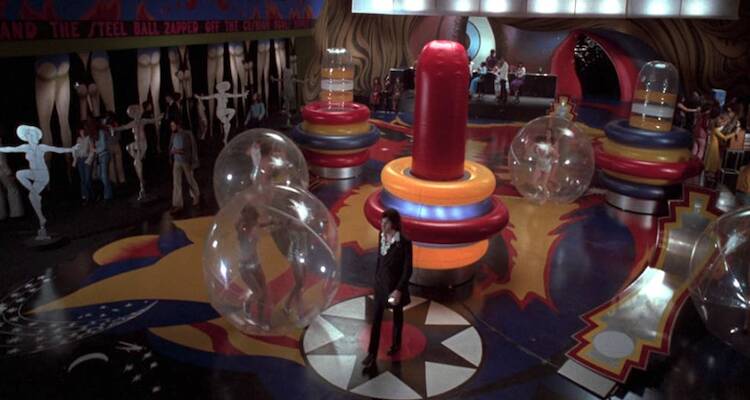What A Tasty World: Three Cult Sci-fi Flicks With Fascinating Futuresex Twists
Wild, weird, wonderful, and undoubtedly thought-provoking

One of the best things about living in the age of the Internet is having access to books, music, and—what we are going to talk about here—movies that otherwise might be lost.
An added specialness to this is discovering works that aren’t just entertaining but also provide unique speculations on the future evolution of human sexuality.
Technotise: Edit & I

The creation of Serbian illustrator Aleksa Gajić—who wrote and directed this film based on his own graphic novel—Technotise: Edit & I (2009) is amazing not just for the staggering skill that went into its animation but also for its tight and thought-provoking script.
Briefly, it tells the story of Edit Stefanović: a student in 2074 Belgrave who, struggling to pass her University exams, resorts to implanting herself with a memory aid chip.
Things really get moving after she visits Abel Mustafov, a mathematical prodigy she has been caring for as part of her part-time job at a government facility. There Edit is exposed to a “theory of everything” program that Abel had previously been working on: one that no one had previously been able to run successfully.
Because of the combination of the chip, the program, and her own consciousness, Edit finds herself sharing her body with a self-aware cybernetic entity she names Edi.
Soon, though, she realizes that as Edi grows and expands her own health is deteriorating: meaning that only one of them will survive.
Technotise: Edit & I is on this list because of Edit’s relationship with Edi. Instead of being a stereotypical artificially intelligent villain, Edi actually cares for Edit and even feels remorse that its existence threatens her own.
In one scene, Edi demonstrates that he can even become an integrated lover to Edit by directly accessing her nervous system: the two of them making love within a shared digital mindscape.
Edit’s layered relationship with Edi gives Technotise: Edit & I a refreshingly unique perspective, especially with so many other films taking an alarmist approach to artificial intelligence.
The Year of the Sex Olympics

Nigel Kneale is a true science-fiction legend, especially in his native United Kingdom. Though already an established writer, in 1953 he practically leapt into universal acclaim with his BBC miniseries The Quatermass Experiment—which was made into a film in 1955.
His tragic rocket scientist protagonist, Bernard Quatermass, would return in three more celebrated series and subsequent feature films based on them: Quatermass II (1955), Quatermass And The Pitt (1959), and finally The Quatermass Conclusion (1979).
Kneale’s work in science fiction was always marked by a unique approach to the genre, evidenced particularly by his 1968 telefilm The Year of the Sex Olympics.
Set in a future when humanity has become separated into Low Drives (the working class) and High Drives (who control the state and the media), the film is both a boldly cynical view of humanity as well as disturbingly prescient.
In the film, the High Drives have begun to realize that their normal programming, such as the titular Sex Olympics, is having less and less of a pacifying effect on the Low Drives.
This changes when the accidental broadcast of a fatal accident, and the Low Drive’s positive reaction, leads them to create The Live Life Show: a brutal reality show where “contestants” are forced to survive on a remote island.
While not exactly a positive depiction of the future of human sexuality, The Year of the Sex Olympics is highly recommended for its cautionary tale of media control through sex, as well as what can happen when that control no longer has an effect.
The Year of the Sex Olympics, especially in light of the continuing popularity of reality television, still has the power to elicit both chills as well as critical examination of how things are—and where we, if we are not careful, could end up.
The Final Programme (Last Days of Man on Earth)

The last film on our list is a 70s science-fiction psychedelic romp based on the science-fiction master Michael Moorcock’s novel, The Final Programme.
Featuring Moorcock’s sexually fluid Jerry Cornelius (played by Jon Finch), the film version of The Final Programme (also called The Last Days of Man on Earth in the United States) practically defies description, though it is still thoroughly enjoyable, especially for fans of the strangeness that are 1960s and 70s science-fiction movies.
Giving it at least a shot, you could say that The Final Programme is about ultra-genius and fashion plate Jerry Cornelius as he at first seeks to rescue his sister, and implied lover, from his maniacal brother, Frank (Derrick O’Connor).
Pursuing Jerry is a gaggle of scientists led by another of Moorcock’s surreal characters, Miss Brunner (Jenny Runacre), who are searching for a microfilm hidden by the elder Cornelius that will allow them to create a “perfect self-replicating” human being.
After Catharine, Jerry and Frank’s sister, is killed, Jerry becomes involved in the project; eventually leading to he and Miss Brunner merging together to form this hybrid, ultra-evolved, being.
Why The Final Programme is here is because of it’s unexpected, to put it mildly, approach to sex—even for the decade in which it was made. It’s as if that period’s already experimental attitudes toward gender and eroticism were put into their own kaleidoscopic machine and bizarrely combined.
In one film, we have the less-than-subtle sexual relationship between Jerry and his sister but also Miss Brunner’s ability to sexually absorb other people, allowing her to gain their talents and intellects.
On top of this, there’s the appearance of the “perfect self-replicating” at the end: which is different in the film versus the book it was adopted from. The former being a neo-Troglodyte and the latter as a shimmering hermaphrodyte.
Treasures to be discovered
Hopefully this brief look at Technotise: Edit & I, The Year of the Sex Olympics, and The Final Programme will stimulate you to begin your own explorations in into obscure cinema—especially when they aren’t just lots of fun but also say, in their own unique way, something about the possible future of sex.
Do you have a film you really enjoy that also explores futuristic sex? Feel free to share in the comments below!
Image sources: IMDB
Leave a reply
You must be logged in to post a comment.

















